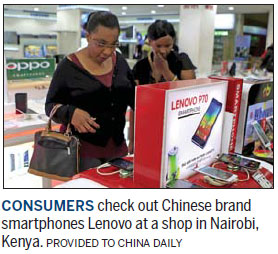Smartphone revolution on the way

Africa, with a population second only to the Asia-Pacific region, is ready for a smartphone revolution that will bring ubiquitous internet access.
Nearly half of the 1.17 billion-strong African population had mobile phone plans by the end of 2015, making up 6 percent of global mobile revenue, according to the latest data from GSM Association, an organization of global mobile operators.
The report, released in November in Tanzania, showed is a 70 percent increase from just five years ago. More important, smartphone sales now account for 23 percent of the mobile phone market.
"Africa is the next big potential battleground for mobile phone vendors in the coming years. As 4G becomes available in more African countries, the demand for smartphones will grow," says Tarun Pathak, senior analyst at Counterpoint Research.
Africa, with feature phones included, is now a bigger mobile phone market than the US, and it will surpass Europe within a few years, as the local telecom infrastructure improves, he says.
GSM also predicts the spectacular growth in mobile demand will give rise to 730 million individual African subscribers by 2020.
The trend is not lost on the minds of senior executives. Chinese companies have moved to the African continent in hopes of establishing a beachhead.

Oppo Communications Corp cracked the market in 2015 with an initial focus on North Africa, where people generally have higher incomes than in other parts of the continent. Huawei Technologies has opened offices there, and handsets made by relatively new players like Xiaomi are also available today.
Wambui Monicah, a mobile phone retailer in Kenya, says he is now selling Chinese brands including Tecno, Oppo and Lenovo.
"I expect more Chinese brands to enter the Kenyan and African markets. There are so many opportunities," he adds.
Still, the market is dominated by low-end gadgets. In the third quarter of 2016, the African market grew by 6 percent year-on-year, mostly driven by the rising demand for feature phones rather than smartphones, data from Counterpoint suggest.
Xiang Ligang, a smartphone expert and the chief executive of telecom industry website cctime.com, said the unstable political conditions in some African states and low incomes are still major obstacles.
masi@chinadaily.com.cn
(China Daily Africa Weekly 02/17/2017 page28)
Today's Top News
- Crossing a milestone in the journey called Sinology
- China-Russia media forum held in Beijing
- Where mobility will drive China and the West
- HK community strongly supports Lai's conviction
- Japan paying high price for PM's rhetoric
- Japan's move to mislead public firmly opposed






























